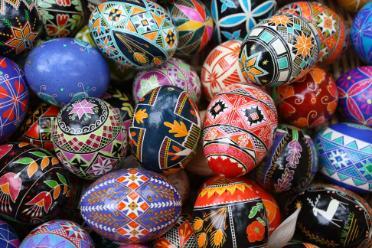CALS Connection Summer 2019
"A CALS Alumnus' Unconventional Road to Medical School"
By Zoe Bowden, agricultural education and communication master’s student
Published June 1, 2019
As a French-speaking, folk-dancing poultry specialist, Dr. David Holcombe’s journey to medical school was full of unexpected turns.
From childhood, Holcombe’s dream was to become a doctor. After receiving multiple rejections from medical schools, he decided that if he couldn’t heal the sick he could at least feed the hungry. This is how Holcombe came to study poultry science during the 1970s in the University of Florida’s College of Agricultural and Life Sciences (CALS), part of the Institute of Food and Agricultural Sciences (IFAS).
Holcombe had an affinity for poultry from a young age. “I raised chickens in my room as a child,” he said. “They would imprint on me and I sort of became their mother.”
He first learned about UF from a flier posted on a bulletin board in the poultry science department at the University of California, Davis, where he received his undergraduate degree and picked up folk dancing as a hobby. His acceptance into UF’s graduate poultry science program brought a welcomed change after living 22 years in California. Once at UF, Holcombe researched poultry nutritional regulation and egg shell strength while living and working at the UF poultry house.
Though Holcombe knew he appeared to be an eccentric, artistic Californian, he found a home within the department under the guidance of caring faculty and advisers.
“I think that two professors there who really left a personal mark on me were Dr. Jack Fry and Dr. David Roland; they were just good people,” Holcombe said. “I was way out there. They recognized the potential in me. I produced a lot of research work and received awards because of the originality of and interest in my research.”
Holcombe’s involvement in the Gainesville International Folk Dancers allowed him to continue his interest in dancing while completing his master’s degree and subsequently working toward his doctorate in the UF/IFAS animal sciences department. During this time, his dream of practicing medicine never disappeared.
With only one year left to complete his Ph.D. in poultry science, Holcombe was accepted into medical school at the Catholic University of Louvain in Brussels, Belgium. To the surprise of his advisers, Holcombe accepted the offer from the university. While grateful for his mentors and time in Gainesville, Holcombe felt compelled to pursue his childhood goal.
Six years later, Holcombe achieved his dream and graduated “avec grande distinction” from medical school in 1981. He then returned to the United States with his Belgian wife and first son to complete his residency at a Johns Hopkins-affiliated clinic in Baltimore, Maryland. After three years, Holcombe moved his family again, now with three small children, to Alexandria, Louisiana, where he currently works in the Louisiana Office of Public Health.
-450x333.JPG)
David Holcombe with his portrait of Edward Jenner, father of vaccinations.
His experience in agriculture and in CALS has intersected with his work in medicine throughout his journey. At his clinic in Louisiana where he treats nutrition issues in people daily, Holcombe can’t help but relate his occupation to his nutritional research with chickens at UF.
“Nutrition, medicine, agriculture – it’s not separate,” Holcombe said. “It’s all in one big system.”
Holcombe notes the benefits of having a CALS degree when pursing medical school. “The medical schools recognize that having people narrowly focused in one domain do not necessarily make good clinicians or people-persons,” Holcombe said. “Agriculture is science, but it’s not your traditional science. It provides depth and breadth of experience.”
Though Holcombe’s goal was medical school from the start, he appreciates the community and skills that his CALS experience provided.
“People don’t consider agriculture as a possible career, and yet, I was rejected from med school and was accepted with open arms in IFAS,” Holcombe said. “Students get this idea that they have to do medicine. That it is the only thing that will give them status, intellectual satisfaction, salary and help others. That isn’t true. Agriculture allows you to go into all kinds of fields — production, research, food science, sanitation and services, and many, many things that people don’t know exist. There’s a huge diversity of possibilities out there that may be far more suitable for them than medicine. You lose nothing and you gain a lot.”
Holcombe has lived and worked in Alexandria, Louisiana, for 26 years. His love for dancing has not diminished. Holcombe and his wife currently teach folk dancing at the local Czech Festival. Poultry hasn’t faded from his life either as he is the resident “chicken expert” for his colleague’s backyard flock and his wife decorates elaborate pysanky, or Ukrainian Easter eggs, each year.

Pysanky eggs made by Nicole Holcombe.
To show appreciation for his time in CALS, Holcombe has pledged a scholarship for at least four years to CALS graduate students, symbolic of the four years he spent in Gainesville.
He encourages students to explore options and be open to opportunities.
“There are so many career avenues that are wonderful where people can make a living and contribute well to society,” Holcombe said. “You have to follow your dreams, and if that path takes you down a weird road to poultry science, then you have to take it.”

